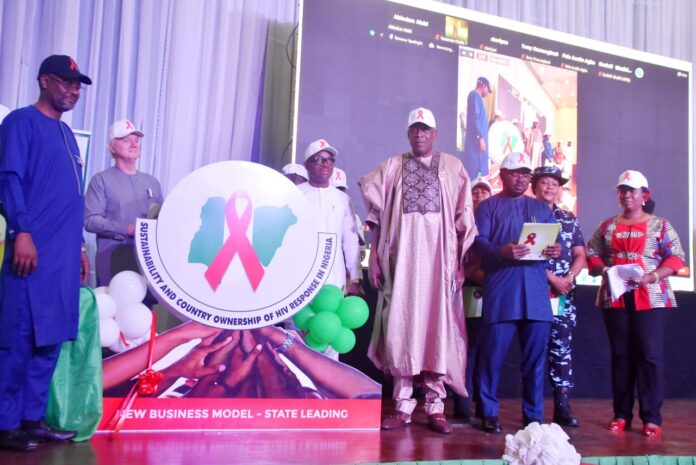In bid to address the huge challenge of sustainability control of HIV-AIDS in Nigeria, the federal government said it is working with the United States Government, United Nations United Nations Programme on HIV/AIDS (UNAIDS) and the Global Fund on an initiative aimed at ensuring country ownership and sustainability of national response beyond 2030.
The collaboration came just as the Secretary to the Government of Federation, Senator George Akume, has said that the President Bola Tinubu-led administration is committed to sustaining the initiative to treat more HIV patients annually using resources mobilised locally.
Akume, who spoke during the commemoration of the World AIDS Day held in Abuja yesterday, said the government recognised the invaluable contributions of communities in the fight against HIV/AIDS.
The Director General of National Agency for the Control of AIDS, Dr. Gambo Aliyu, said the leadership of communities of persons living with HIV, key affected populations, women, adolescent and young persons; policy makers, religious, traditional and political leaders, civil society organisations, development partners, organised private sector, the general public and the media has critical role to ending social, cultural, legal and economic inequalities holding back progress to ending AIDS and elimination of mother-to-child transmission of HIV.
He said the sustainability agenda was an initiative of NACA in collaboration with its development partners supporting the national HIV response that ensures that community leaders take ownership of the programme.
In addition, he said it is an advocacy tool to the government at all levels to increase HIV financing especially in the light of dwindling resources from donor agencies.
Aliyu said that despite the government’s funding of the national response, evidence showed that the HIV response in Nigeria has really been donor driven.
For instance, he said that in 2021, data showed that the total HIV expenditure was estimated at $532m out of which $91.5m (17.2 percent) was from public sources while $441m (82.8 percent) was funded by International sources with others contributing less than one per cent.
According to Aliyu, the goal of the initiative is centred on an effective and efficient HIV response owned, driven, resourced and led by the people and the government of Nigeria at different levels, with support from her partners. The key goal of the new HIV response initiative is to promote efficiency, Government-led shared responsibility and strengthen HIV multi sectoral response
The theme of the 2023 World AIDS Day: ‘Communities: Leadership to End AIDS by 2030’’, acknowledges the essential role of community leadership in our last mile push to ending AIDS by 2030.
Aliyu maintained that over the last four years and especially during the period of COVID-19 epidemic, Nigeria has demonstrated tremendous capacity for HIV case identification at community level. He added that Nigeria’s HIV response was the most COVID-19 resilient globally.
“As the country continues to make commendable progress towards achieving epidemic control necessary to end AIDS by 2030, we are also mindful of the fact that ending AIDS comes with huge challenge of sustainability of the control.
“To overcome this challenge, Government of Nigeria, United States Government, UNAIDS and the Global Fund initiated alignment programme aimed at ensuring country ownership and sustainability of national response beyond 2030,” he said.
While restating the agency’s commitment to ending HIV-AIDS in the country, Aliyu said: “Nigeria can end AIDS before 2030 with support of our community leaders. We can end stigma and discrimination, we can ensure no babies in our communities is born with HIV; Yes, we can. We did it with Ebola, we repeated with COVID-19 and we can do it with HIV because we are Nigerians.”

























